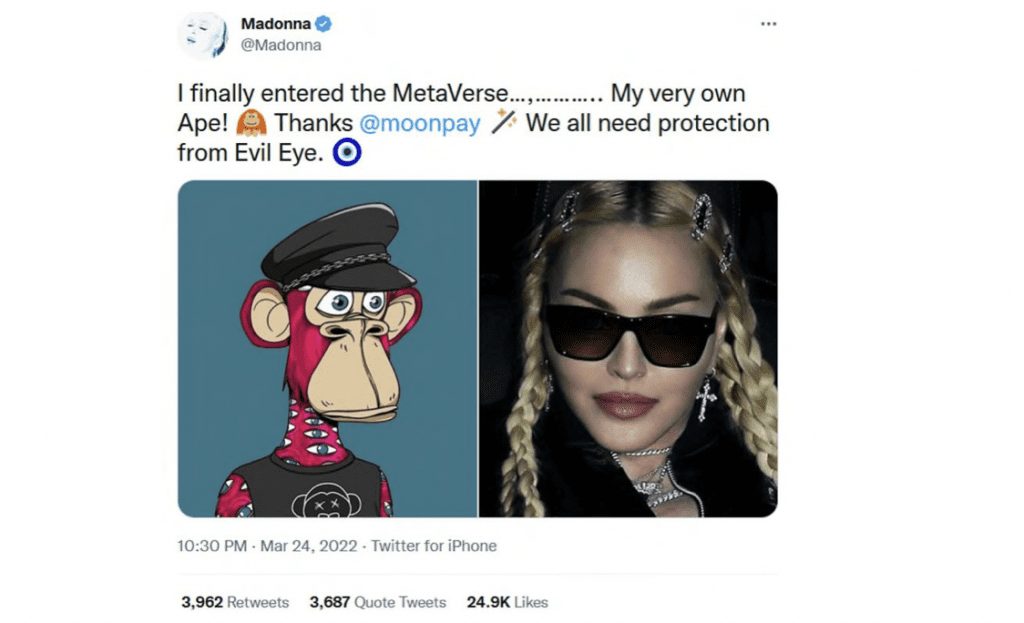Celebrities named in new lawsuit over Bored Ape NFT campaign
The company behind Bored Ape Yacht Club non-fungible tokens (“NFTs”), Hollywood agent Guy Oseary, and a host of major celebrities and brands – from adidas and Universal to Justin Bieber, Madonna, Gwyneth Paltrow and Serena Williams – are among a long list of defendants allegedly on the hook for continuing a scheme to promote Bored Ape NFTs while violating numerous federal and California state laws. In the lawsuit, which they filed in California federal court on December 8, plaintiffs Adonis Real and Adam Titcher allege that the defendants engaged in an attempt to deceive consumers using “manufactured celebrity endorsements and deceptive promotions” that helped to “artificially increase interest in and price of Bored Ape NFTs, causing investors to buy their investments at drastically inflated prices.”
According to the newly filed lawsuit, the defendants’ efforts to boost interest in — and prices — Bored Ape NFTs came about through a “large scheme between blockchain startup Yuga Labs, highly connected Hollywood agent (Guy Oseary) and a front operation (MoonPay)” and more than a dozen well-known figures, “all of whom united for the purpose of soliciting and selling a variety of digital assets.” Specifically, Real and Titcher allege that “executives at Yuga and Oseary conspired to exploit their vast networks of A-list musicians, athletes and celebrity clients and associates to falsely promote and sell Yuga Financial Products” in exchange for being “highly compensated [but] without disclosing such [compensation].”
The allegedly undisclosed celebrity campaigns of BAYC NFTs and MoonPay, the latter of which “purports to be a white glove survivor designed to help the super-rich and famous buy NFTs,” range from on-air shout-outs by Fallon to social media posts from, among others, Paltrow, Bieber and Madonna. Specifically, the plaintiffs allege that on a Nov. 21 episode of the Tonight Show, Fallon “promoted MoonPay and the BAYC NFT collection” by saying he “bought a monkey” using MoonPay’s services when, in reality, “MoonPay and/or Oseary …recruited and paid Fallon to promote both MoonPay and the BAYC collection during the Tonight Show segment.”

“Fallon did not disclose that he had a financial interest in MoonPay,” in which he is an early investor, “or that he was likewise financially interested, directly or indirectly, in the increased sales or popularity of the Yuga papers,” according to the complaint. Oseary’s venture capital firm, Sound Ventures, was one of the early investors in MoonPay, along with Justin Bieber, Paris Hilton, Jimmy Fallon, Gwyneth Paltrow, [and] Serena Williams,” among other defendants, the plaintiffs allege in the complaint.) More than that, the plaintiffs allege that Fallon later promoted NFT and MoonPay on Twitter but “failed to disclose that [his] promotion” was “exclusively due to his financial interests.”
Paris Hilton then appeared on Fallon’s show, during which time she promoted both BAYC NFTs and MoonPay, and followed up that appearance with social media campaigns for the two ventures. The plaintiffs allege that “Hilton and MoonPay intentionally did not disclose Hilton’s direct financial interest in MoonPay and related to the increased sales of Yuga securities through MoonPay.” And again, they claim that “there was no disclosure by any of the Tonight Show’s production companies….regarding Hilton’s and/or Fallon’s financial interests in MoonPay or compensation for promoting the BAYC NFTs
“Other members of Oseary’s network follow a similar pattern of promoting the BAYC collection of NFTs in connection with MoonPay,” according to the plaintiffs, who allege that each of the famous backers “received Yuga Financial Products and/or other forms of consideration that some or all of their compensation for promoting the Yuga securities or the Yuga brand generally,” but failed to disclose the compensation required by the Federal Trade Commission (“FTC”) (which we previously addressed here)—and potentially the securities and the Stock Exchange Commission (“SEC”).
(The FTC requires advertisers/sponsors to disclose “material connections” with their sponsoring advertisers using clear and conspicuous language; the FTC has previously stated that vaguely thanking the other party is insufficient. Meanwhile, the SEC has stated that individuals who promote ” a virtual token or coin that is a security must disclose the nature, scope and amount of compensation received in exchange for the promotion,” meaning that disclosures, such as #ad, alone are not sufficient when the product/asset to be promoted is a Safety.)
While the Defendants’ attempts to increase interest in and prices of the BAYC NFTs were successful, the Plaintiffs allege that “the meteoric rise of the BAYC NFTs did not last long, and the floor price of the pool began to deflate immediately after the failed launch of the BAYC metaverse and mis-selling of virtual land on Otherside [platform] April 30, 2022.” With the foregoing in mind, the plaintiffs have asserted a variety of claims, including violations of Section 10(b) of the Exchange Act, which prohibits fraud in the purchase or sale of securities; and Sections 5 and 12(a) (1) of the Securities Act, which prohibits the unregistered offer and sale of securities.They similarly charge the defendants with violating the California Unfair Competition Law and the California Consumers Legal Remedies Act, and with engaging in aiding and abetting and civil conspiracy.
In addition to seeking certification of their proposed class action, the plaintiffs are seeking “appropriate injunctive relief” and monetary damages.
It is unclear whether the lawsuit allegations will receive attention from the FTC in light of the alleged violations of the FTC Act by the defendants. As for the SEC, the lawsuit follows reports this fall that the agency was investigating Miami-based Yuga Labs to determine whether its offerings constitute unregulated securities. “The SEC is investigating whether certain NFTs from [Yuga Labs] is more akin to stocks and shoulds [be subject to] the same disclosure rules,” Bloomberg first reported in October, citing a person familiar with the matter. The SEC was also said to be looking into Yuga’s release of ApeCoin governance tokens, which were distributed this spring to some Bored Ape NFT holders.
The case is Adonis Real, et al., v. Yuga Labs, Inc., et al., 2:22-cv-08909 (CD Cal.).

